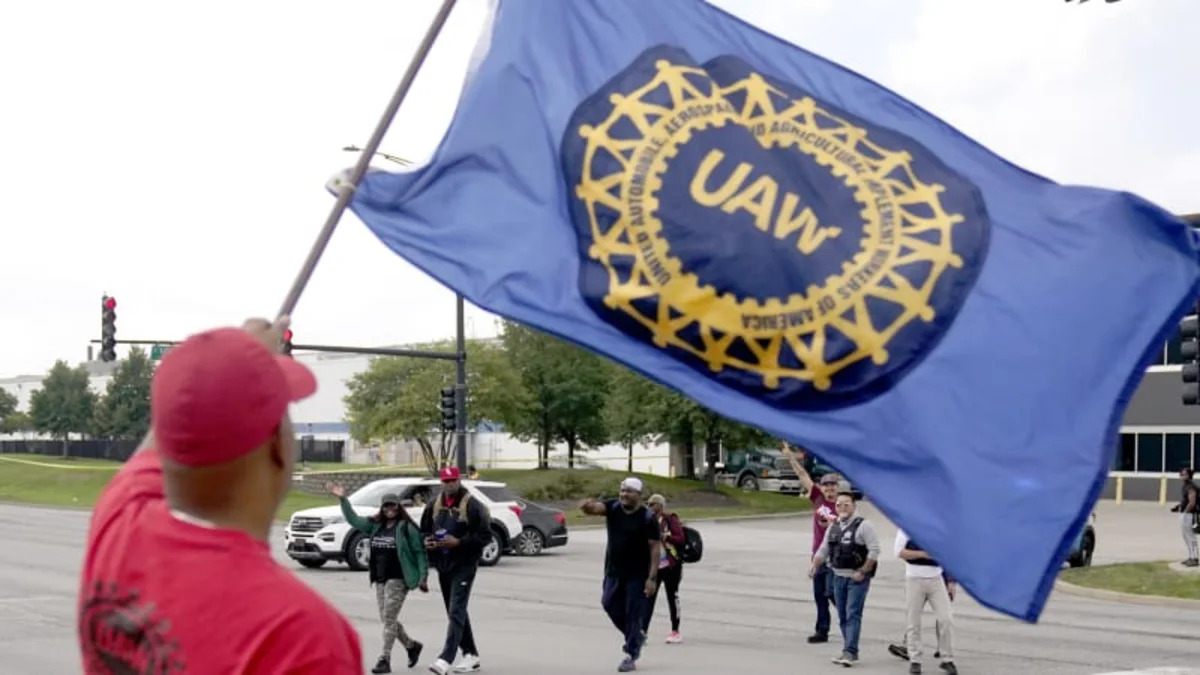Members of the United Auto Worker union walk out of the Chicago Ford Assembly Plant as Lance Williams from Lansing, Ill., waves the UAW flag Friday. (AP)
As the United Auto Workers walk off the job at an additional Ford and General Motors plant, Ford CEO Jim Farley addressed investors and members of the media Friday, pleading the case for the company's latest overture to the union and addressing both public and investor concerns regarding the core issues facing American manufacturing.
Farley made a public case for Ford's efforts to resolve the dispute, expressing frustration with the ongoing stalemate and noting both the concessions Ford offered before the strike began and the signing of a contract with Canada's Unifor.
Farley also acknowledged UAW President Shawn Fain's success in getting the union's message out, quipping: "Shawn has been on TV more than Jake from State Farm at this point."
The first-ever simultaneous strike against the Detroit Three automakers enters its third week with threats of continued expansion, but little in the way of obvious concrete progress.
"If the UAW’s goal is a record contract, they have already achieved this," Farley said. "It is grossly irresponsible to escalate these strikes and hurt thousands of families."
Farley also lamented the fact that EVs have become the subject of partisan conflict, with the company's recently announced battery production facilities taking heat from both pundits and investors as Ford was forced to press pause on the venture while negotiations continue. Former President Donald Trump dropped in to Michigan this week to declare EVs the enemy of blue-collar jobs.
"They've become a political football, and that's a shame," he said.
Friday saw an expansion of the UAW strike to Ford's Chicago assembly plant and GM's Lansing, Delta Township, Michigan, assembly plant, covering about 7,000 workers, Fain said in an announcement, bringing the total number of workers on the picket lines to 25,000. The strike will not include any additional members at Stellantis, where talks have reportedly been more productive.
The Ford and GM plants went on strike at noon Eastern today (Friday). Ford builds the Explorer and Lincoln Aviator in Chicago. GM's Delta Township plant builds Chevy Traverse and Buick Enclave.
"Despite our willingness to bargain, Ford and GM have refused to make meaningful progress," Fain said in a video address Friday morning. He noted that prior to his announcement, the UAW had seen a "flurry" of interest from the companies on Friday morning.
The UAW had been planning to announce a new strike at Stellantis, sources briefed on the matter said, but moments before Fain's scheduled 10 a.m. announcement Stellantis called and made significant changes in its contract proposal, Fain said.
On Thursday, the union made a counter-proposal to Stellantis. Talks among the UAW and negotiators for the Detroit Three were described as "very active" by one person briefed on the situation.
"To be clear, negotiations haven't broken down. We're still talking with all three companies and I'm still very hopeful that we can reach a deal," Fain said. "We are fed up with corporate greed and we are fed up with corporate excess. We are fed up with breaking our bodies for companies that take more and more and give less and less."
The UAW is expected to continue work stoppages currently under way until a new contract is ratified, a source familiar with the situation said, speaking on condition of anonymity.
The strike is now entering its third week as the autoworkers push for higher wages and benefits and the elimination of a tiered standard that pays newer workers far less.
Automakers say the union's demands would hurt their profits as they try to compete with nonunion manufacturers like Tesla.
The union escalated the initial strike on Sept. 22, when workers walked off the job at General Motors and Stellantis distribution facilities in 20 states nationwide. It began on Sept. 15, when workers struck at one plant each from GM, Ford and Stellantis. The UAW did not strike at Ford distribution facilities, citing progress in talks with that company.
Headed into Friday, about 18,300 UAW members at the Detroit Three were on strike, or about 12% of the 146,000 union members working at the automakers. Strikers have been getting $500 a week from the UAW's strike fund.
The union previously shut one assembly plant at each of the Detroit Three, and 38 parts distribution centers at GM and Stellantis.
Ford shares fell 0.2% and GM shares were down 0.2% in trading Friday. Stellantis shares gained 0.6% in trading in Milan.
The effect of these walkouts has been relatively limited compared to the financial hit from halting assembly lines that build Ford F-series, Chevy Silverados and Ram trucks.
Analysts estimate GM, Ford and Stellantis earn as much as $15,000 per vehicle on each of their respective large pickup truck models.
The UAW has taken a new approach with walkouts to turn up pressure on the automakers. Rather than the hammer blow of a mass walkout, the UAW has used strikes like a ratchet, keeping company executives guessing where the next turn would come.
The union expanded its strikes against GM and Stellantis, but kept its Ford walkout limited to a single plant due to progress in those talks.
The union and the companies remain far apart on key economic issues. Fain has stuck with a demand for 40% pay hikes over a four-year contract, a position supported by President Joe Biden during a visit to Detroit on Tuesday. The companies have countered with offers of about 20%.
The UAW also is pushing automakers to eliminate the two-tier wage system, under which new hires can earn far less than veterans.
(Reporting by David Shepardson and Joseph White Editing by Nick Zieminski)


Sign in to post
Please sign in to leave a comment.
Continue